- Health Conditions A-Z
- Health & Wellness
- Nutrition
- Fitness
- Health News
- Ayurveda
- Videos
- Medicine A-Z
- Parenting
Men's Health: Can Peanut Butter Help You Gain Muscle?
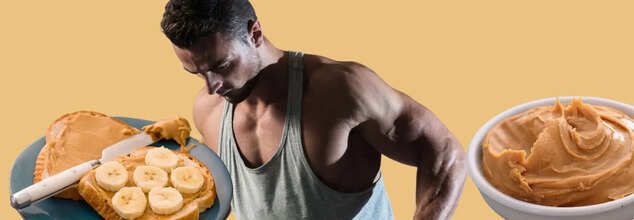
Peanut Butter (Credit: Canva)
If you find yourself at that in-between moment when it’s not quite time for a meal but hunger pangs are creeping in, peanut butter is a go-to option that can satisfy your cravings. Whether you enjoy it spread on toast, dunked with apple slices, or simply by the spoonful, peanut butter offers a convenient and delicious way to snack. However, it’s important to keep a few guidelines in mind to ensure you’re making the healthiest choice.
Why Should You Eat Peanut Butter?
Peanut Butter is a nutrient-dense source of energy that provides several health benefits. Fitness expert Avery Zenker, R.D., told Men's Health that peanut butter is rich in healthy unsaturated fats, protein, and fiber. Additionally, it contains essential vitamins and minerals, including magnesium, vitamin E, niacin (vitamin B3), and zinc.
One of the standout nutrients in peanut butter is fat, which makes up about 55 grams per 100 grams. While fat often gets a bad reputation, the unsaturated fats found in peanut butter can contribute positively to heart health when consumed in moderation. In fact, it’s an excellent source of vitamin B3, providing 89% of the recommended daily value. This vitamin is crucial for metabolism and DNA repair, making it an essential component of your diet.
Peanut butter is also notable for its vitamin E content, offering 60% of the recommended daily value per serving. Vitamin E acts as a powerful antioxidant, helping to stabilize free radicals and minimize oxidative damage in the body. It plays a vital role in supporting the immune system, protecting against infectious agents, and promoting overall health.
Beyond these key nutrients, peanut butter contains magnesium, which is essential for healthy nerve, blood, and bone function. It also provides phosphorus, which helps cells operate effectively, and zinc, which supports immune function. Additionally, niacin aids digestion, while vitamin B6 is involved in numerous bodily processes.
Can Peanut Butter Help Your Gain Muscle?
According to experts, any man who is looking to bulk up, should benefit immensely from the consumption of peanut butter, however it may not be the most efficient option.
Two tablespoons of peanut butter have eight grams of protein, and about 190 calories. A typical protein bar has about 200 calories, and 20 grams of protein, according to Men's Health. On the contrary, peanut butter can also help you lose weight, as long as you use it right. This is because eating a spoonful or two of peanut butter can help you stave off hunger and contribute to you consuming fewer calories later.
However, word of caution. According to nutritionists, Peanut Butter with its protein and fibre, helps trap sugar molecules and prevent all of them from getting absorbed by the body. This unaborbed sugar can be sent to liver to be stored as fat. Therefore, it's important to be aware that more than 3.5 ounces of peanut butter per day can easily add to the equivalent of a meal.
Why You Should Use Moringa Sanitary Pads, Expert Reveals
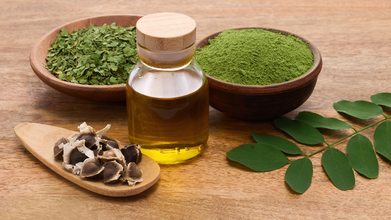
(Photos: Canva)
Pads are made of synthetic fibres that cause rashes and bacterial infections that further lead to serious problems such as Reproductive Tract Infections, skin irritation, Urinary Tract Infections and Bacterial Vaginosis.
Every month millions of synthetic pads are discarded and many suffer from serious menstrual hygiene problems. Officials note that about 70 percent of reproductive diseases in India are linked to poor menstrual hygiene, affecting nearly 120 million adolescent girls.
Dr Richa Singhal, senior consultant, obstetrics and gynaecology, at Cloud Nine Hospital in Delhi's Patparganj notes: ''A sanitary pad's top-sheet contacts sensitive intimate skin for several days each month."
Poor hygiene, such as reusing unclean cloths or not changing materials frequently, causes infections and itching, rashes, foul odor can increase the chances of cervical cancer.
Here are some alternatives that can replace synthetic pads and prevent serious health issues:
Moringa PadsMoringa, also known as miracle tree, can be consumed in the form of powder, leaves or tablets. Used for its medicinal properties, it has as a 5,000-year history, deeply rooted in Ayurveda for medicinal use.
In modern times, gynaecologists recommend moringa based pads to reduce the risk of urinary tract infections, bacterial vaginosis and yeast infections during menstruation.
It is known for its antimicrobial, anti-inflammatory and antioxidant properties which make it suitable for intimate areas and menstrual care.
Packed with high levels of Vitamin E and fatty acids which strengthen skin barriers and prevent chafing, viable for those who have extended periods. Rich in bioactive compounds, it supports vaginal health by balancing PH level making it suitable for menstrual pads.
These pads can reduce the risk of skin infections, UTIs and yeast infections.
Cotton Reusable Pads
These are eco-friendly as they are made from layers of absorbent cotton, bamboo, or fabric. Contrary to synthetic pads, these are good for your skin and prevent rashes caused from synthetic materials.Period Underwear
Serving as a reusable and sustainable alternative, period under wears keep you dry and comfortable for hours without causing you infectionsThis Natural Fruit Can Replace Sugar On Your Table
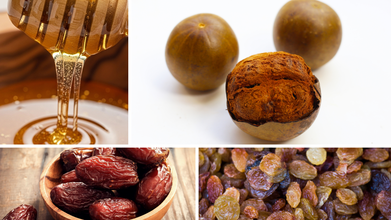
Natural Sweeteners (Photos: Canva)
The switch from white sugar to natural sweeteners like honey, dates and coconut sugar are becoming popular as people grow more away of the side effects of refined sugar.
Among these, monk fruit stands out as a low-calorie alternative that supports metabolic health.
According to National Institutes of Health, consuming white sugar results in allergic reactions and severe metabolic effects and cardiovascular effects. Medical conditions like diabetes, obesity, and fatty liver diseases.
Monk fruit
Monk fruit extract is obtained from the 'Siraitia grosvenorii' plant, which is native to China. It provides a calorie-free alternative to sugar, rich in antioxidants, ideal for weight management and reducing inflammation.Monk fruit sweeteners are produced by removing the seeds and skin, crushing the fruit, and then extracting its sweet portions into liquid and powdered forms. Its extracts are being used in sweeteners, packaged foods and beverages.
The International Food Information Council recommends this fruit-based sweetener to diabetic individuals to satisfy their desire for sweet taste while managing sugar intake.
Which Other Natural Sweeteners Can You Use?
Natural sugar is the naturally occurring sweetness in food, they are derived from natural sources like plants, fruits or tree ap, rather than being refined chemically.
They are packed with nutrients that help offset some of the negative aspects of the sugar content. They are comparatively less processed and contain lower glycemic acid which prevents sudden blood sugar spikes.
The key is not eliminating sugar from your diet but replacing it with healthier options like:
1. Fruit JuiceFruit juice is a healthier alternative when made without preservatives or added sugars, but fibre content is low compared to raw fruit.
Bananas, berries and mangoes are good as fruits that contain natural sweetness, they are packed with nutrients that boost immunity.
2. Honey and Maple Syrup
Honey, molasses and maple syrup contain natural sugar and nutritional benefits. These foods are filled with antioxidants and antibacterial properties that help stabilise gut health.They act as an effective cough remedy and can be added to oatmeal, yogurt or act as a substitute of sugar in tea and coffee. It also helps in lowering blood pressure and stabilizing digestive health.
3. Dates and Rasins
Known to be energy boosters, dates and raisins are rich sources of glucose and fructose, making them an excellent pre-workout snack. Their high fibre content is also good for maintaining digestive health.Whole or powdered dates can be added to hot milk or even cakes to make them healthier.
6 Foods That Helps You With Muscle Recovery

Credits: Canva
When you lift heavy or workout, you feel like your muscles have been strained, this is because before you muscles are build, there are small muscle ruptures. More than exercise, what matters is what you eat to help you muscles recover. The process is called hypertrophy, when intentional, controlled micro-tears caused by resistance training trigger the body to repair and strengthen muscle fibers. This process requires a specific cycle of damage, rest, and nutrition to be effective.
University of North Carolina Health Wellness Services manager and a certified personal trainer Kathy DeBlasio also explains, "You make microtears in your muscles when you work them. As you heal, you gain muscle and strength." She explains that these tiny tears cause you to feel pain, but they heal within 24 to 48 hours. What matters the most is your diet. There are different foods that help you recover your muscles. Here is a list of 6 foods for you to consume for muscle recovery.
Chicken
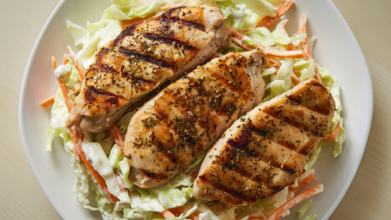
Duke Health notes that chicken breast is a lean source of high-quality protein essential for repairing and building muscles. It is also rich in amino acids, especially leucine, which is important for muscle synthesis. A 2024 study in Physiological Reports, noted that chicken intake, combined with resistance training on muscle mass has helped improve strength and muscle mass of elderly women.
Cottage Cheese
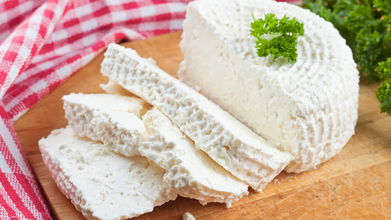
Registered dietitian Maddie Pasquariello, RD told Paloton, “Cottage cheese can be a very nutritious addition to your diet from both a macro- and micronutrient standpoint." Pasquariello explained that half-cup serving of full-fat cottage cheese packs around 13 grams of protein. It helps as a building block of muscles, bones, cartilage, skin, hair, and nails. It also helps build and repair tissue. It oxygenates red blood cells to nourish your body with nutrients, helps regulate hormones, supports the production of enzymes used to digest food and create new cells. It also helps in repairing and building muscles.
Potatoes
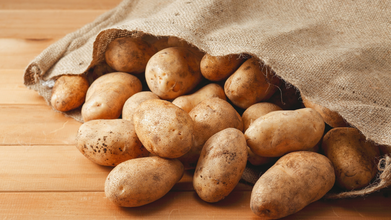
A 2022 study published in the journal Medicine & Science in Sports & Exercise (MSSE) notes that that potatoes contain a 1.5 per cent protein based on their based on their fresh weight. However, when potatoes are used for starch extraction, a residue remains, that can be used to extract potato protein. Ingestion of 30 g potato protein concentrate increases muscle protein synthesis rates both at rest and during recovery from exercise.
Read: 14 Drinks Or More A Week Could Increase You Risk Of Colon Cancer By 25%
Pomegranate Juice
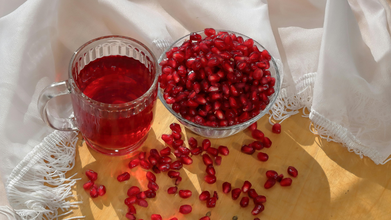
A 2016 study published in PLOS One notes that pomegranate supplementation accelerates recovery of muscle damage and soreness and inflammatory markers after a weightlifting training session. The study notes: "optimal dose of pomegranate supplementation, showed that either once-daily or twice-daily dietary pomegranate juice supplementation improves strength recovery of both leg and arm muscles after an unaccustomed eccentric exercise."
Eggs
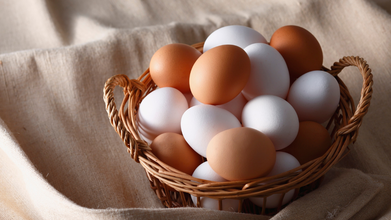
Natalie Rizzo, MS, RD, a registered dietitian, specializing in sports writes: "Eggs have a unique nutrition profile that is great for athletes of all ages. While they make a nice addition to any meal of the day, the nutrients in eggs can help with recovery after exercise."
Fatty Fish
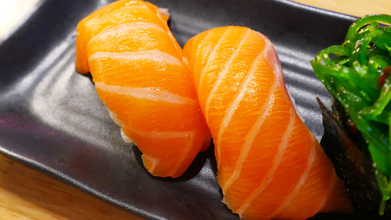
A 2024 study published in Clinical Nutrition ESPEN notes that omega-3 fatty acids in fatty fish could help increase muscle strength, however it does not increase in muscular mass. The study notes: "The interventions of omega-3 fatty acids supplementation and resistance training show promise as a countermeasure against muscular dysfunction."
© 2024 Bennett, Coleman & Company Limited

